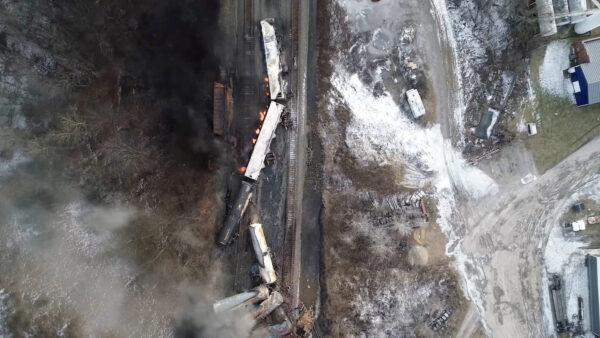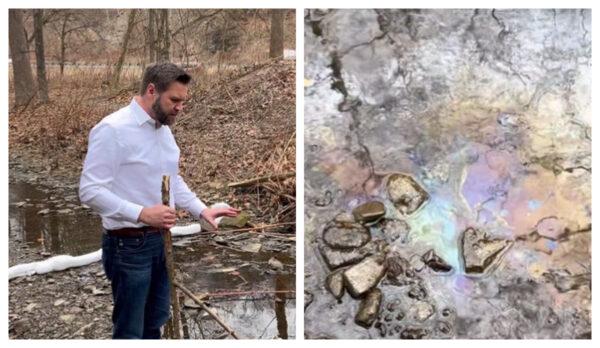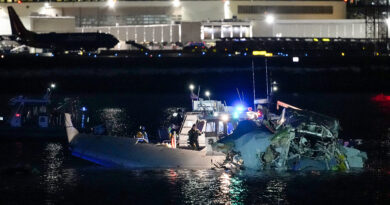East Palestine Residents Remain Concerned and Frustrated Two Years Post-Toxic Train Derailment
February 3, 2023, marks two years since a Norfolk Southern train transporting hazardous materials derailed in the village along the Ohio-Pennsylvania border.
EAST PALESTINE, Ohio—As a lifelong resident of East Palestine, a place his family has called home for generations, Greg Mascher yearns for the village he remembers from before February 3, 2023.
“This town meant everything to me. It was a wonderful place to live and raise a family—a great place to grow up,” Mascher shared with The Epoch Times on January 31. “Most people across Ohio couldn’t even locate East Palestine on a map. I wish we could return to how things were, but that’s not possible. Now, we face an uncertain present and future.”
A youth basketball coach raising his granddaughters, Mascher’s home is a popular gathering spot where children play in the backyard and ride their bikes. He is concerned about their long-term safety due to the incident that made East Palestine a household name.
Life in this village, situated near the Ohio-Pennsylvania border, changed dramatically around 9 p.m. on February 3, 2023. The crew of a Norfolk Southern Railway freight train carrying 151 cars spotted smoke and fire, realizing that 38 cars had derailed. The flammable toxic chemicals in 11 derailed cars ignited, resulting in flames spreading to an additional 12 cars.
As reported by the National Transportation Safety Board, nine cars were transporting hazardous materials on top of the 11 that derailed.
The hazardous chemicals, including vinyl chloride found in some of the rail cars, began leaking onto the ground and into the air.
Vinyl chloride, used to manufacture PVC pipes and other products, is associated with various cancers, as noted by the National Cancer Institute, including those affecting the brain, lungs, blood, lymphatic system, and liver.
When burned, vinyl chloride generates carbon monoxide and hydrogen chloride. The latter can create hydrochloric acid upon contact with water, a corrosive substance that can cause burns to the skin and eyes, and is toxic when inhaled.
Additionally, igniting vinyl chloride produces a small quantity of phosgene gas, which was historically used as a chemical weapon during World War I.
Though labeled a “controlled burn,” local residents claim it was anything but controlled. A dark cloud filled with chemicals drifted for miles, depositing debris on properties several miles away.
The detonation ruptured the train cars, releasing their remaining contents into a drainage ditch connected to Sulphur Run, a stream that runs through the heart of East Palestine.
Prior to the burn, Ohio Republican Governor Mike DeWine urged residents to evacuate an area measuring one mile by two miles surrounding East Palestine, which included portions of Ohio and Pennsylvania.
DeWine characterized the urgent evacuation as a “matter of life and death.”
Three days later, DeWine held a press conference where he announced that the evacuation order had been lifted and residents could return home. Norfolk Southern trains resumed their routes through East Palestine, and federal and state officials assured that testing indicated the air and water were safe.
Two years later, unease and uncertainty still persist. Officials from federal and state agencies consistently claim that tests confirm the air and water in East Palestine and nearby communities are safe. Nevertheless, residents continue to report toxic odors in the air, burning sensations in their eyes, rashes, and headaches, among other health concerns.
In the aftermath of the disaster, Norfolk Southern CEO Alan Shaw repeatedly asserted that the company would “make it right” in East Palestine. Shaw is no longer the CEO. Officials from Norfolk Southern maintain that ongoing environmental testing shows the air and water are safe. However, many residents of East Palestine narrate a vastly different story—one filled with anxiety and uncertainty about the future, coupled with distrust of state and federal agencies.
‘It’s Not Normal’

Greg Mascher and a granddaughter sit with their dog, Dylan, in their East Palestine, Ohio, home on Jan. 31, 2025. Jeff Louderback/The Epoch Times
Mr. Mascher recalls that before the disaster, East Palestine was a “tight-knit” community, but it has since become fractured.
Some residents express frustration over the lack of transparency, delayed compensation, and ongoing uncertainty regarding the community’s safety. Others prefer to move on from the derailment and focus on future prospects.
“This is not the town I remember. Many who voice concerns about inaction from local, state, federal government, and Norfolk Southern face criticism and even ostracism from those who wish to forget the tragedy; it’s disheartening,” Mascher said.
“Prior to February 3, 2023, we didn’t worry about the trains passing through town, we didn’t second guess the water we used for drinking, cooking, or bathing. We felt safe walking our dog by the creek. Now, those worries are constant. They linger in your mind,” Mascher expressed.
Diana Campbell, along with her husband Bo Campbell and their two children, spoke to The Epoch Times while enjoying breakfast at Sprinklz on Top, a diner situated in downtown East Palestine.
The community used to be a favored destination for the family. Bo’s mother resided in the area for years, and her home served as a beloved gathering spot for family and friends.
Following the derailment, Bo’s mother eventually relocated several miles away to a rural setting, discarding most of her possessions due to contamination fears. For weeks ensuing the incident, she felt ill from “chemical smells.”
The Campbells reside in western Pennsylvania, approximately seven miles from the crash site.
“On the surface, it appears normal here, but it is anything but. There’s a pervasive uncertainty. So many thoughts that didn’t cross our minds before now arise daily—like when a train is approaching, when we take a shower, or when we walk near a creek or stream. We shouldn’t have to question the safety of these activities, but that is our reality now,” Campbell lamented.
Diana Campbell queried her son, Max, on what he refers to the water that flows from their home faucet.
“Train water,” he replied.

Diana Campbell and her husband, Bo Campbell, have breakfast with their children in East Palestine, Ohio, on Jan. 31, 2025. Jeff Louderback/The Epoch Times
The Campbells rely on a reverse osmosis system for their drinking water.
“I miss the East Palestine of the past; the type of place where everyone knows each other, children ride their bikes in the neighborhood, and Fourth of July celebrations resemble scenes from classic movies,” she reminisced. “Now, we have to convince ourselves to come into the village.”
Battles Continue in Court
Recently, Norfolk Southern agreed to a $22 million settlement with East Palestine, in addition to the $13.5 million previously paid to the village for upgrading its water treatment facility and replacing fire and police equipment. Furthermore, Norfolk Southern has pledged $25 million for enhancements at East Palestine’s municipal park.
Norfolk Southern and East Palestine also concurred that a proposed $20 million regional safety training center in the village would not be established due to operational cost concerns.
The railroad company agreed to transfer the 15 acres originally acquired for the center to the village.
East Palestine Mayor Trent Conaway stated at a press conference following the announcement of the settlement that the village council will decide how to allocate the settlement funds. He expressed a desire for the funds to be utilized for economic development.
Conaway aims for East Palestine to regain the vibrancy of the 1970s and 1980s, when “it flourished.”
“The derailment disrupted our lives,” he remarked. “We want the community not to be characterized solely by the derailment.”

Drone footage captures the freight train derailment in East Palestine, Ohio, on February 6, 2023. NTSBGov/Handout via Reuters
A segment of residents is contesting the settlement, requesting that a court overturn a judge’s order mandating they pay an $850,000 bond to continue appealing for additional compensation and comprehensive contamination data regarding the disaster.
An estimated $300 million of the settlement remains on hold pending the outcome of the appeal.
Lawyers have not disclosed the ratio of the approximately 55,000 claims filed for injuries versus property damage claims, nor have they reported the reimbursement amount for each individual.
Residents living within 10 miles of the disaster were eligible to receive up to $25,000 per person, contingent on their surrendering the right to sue for potential future health issues like cancer.
Conversely, the property damage claims offer a more generous payout of up to $70,000 per household for residents within two miles of the crash site, tapering off for those further away, extending up to 20 miles.
The payment for legal fees is already set at $162 million as part of the judge-approved settlement, a figure that will only change if the agreement is nullified upon appeal.
In conjunction with the $600 million settlement, another agreement with the federal government is currently awaiting judicial approval.
Norfolk Southern did not acknowledge any wrongdoing in either settlement.
A multitude of other legal issues surrounding the train derailment and the subsequent venting and burning of materials are ongoing. Various businesses and government entities in the region have independent lawsuits pending against Norfolk Southern. The railroad company continues to pursue legal action against companies, such as the chemical producer responsible for the vinyl chloride and tank car owners, to share cleanup costs.
Both Ohio and Pennsylvania have active lawsuits against Norfolk Southern.
Locals Look to New Leadership

Sen. J.D. Vance (R-Ohio) in a Twitter video dated February 16, 2023, at Leslie Run in East Palestine, Ohio. Screenshot of Twitter video/Courtesy of Sen. J.D. Vance’s Office
On February 3, Vice President JD Vance will visit East Palestine alongside Ohio Governor Mike DeWine, Republican U.S. Senators Bernie Moreno and Jon Husted, and new U.S. EPA Administrator Lee Zeldin.
Residents hope that the Trump administration will provide a more responsive approach to aiding the community as it continues to address the fallout from the disaster.
Danielle Deal lives in New Waterford, within 10 miles of the crash site. She has actively voiced her concerns, emphasizing the need for more tangible government support.
“Life has changed permanently in this area as a result of the incident; things cannot revert to how they once were. The water is polluted, and the chemicals have permeated the soil. It’s now an everyday reality for us,” Deal stated for The Epoch Times.
“We are seeking actions that demonstrate real help. Words alone are insufficient. Unless we receive the support we urgently need, politicians’ visits may serve them more than us,” she added.
Mascher wishes to see Norfolk Southern “compensate for devalued properties or offer fair market value for homes pre-derailment.” He indicated a desire to relocate to ensure his granddaughters’ safety, yet financial constraints hinder him.
“They have the capacity to buy out anyone willing to leave and provide them with additional funds for a fresh start. Yet, they haven’t taken that step. They haven’t made amends—not even close,” he lamented.
“I’d like to see the Trump administration direct FEMA to declare this a disaster area and release federal funds and assistance,” he expressed.
Campbell seeks a more significant investment to ensure long-term medical coverage for residents.
“People continue to fall ill. Who knows the implications five or ten years down the line? Will we see a spike in cancer and other health conditions? Comprehensive studies must be conducted by independent groups, unconnected to Norfolk Southern,” Campbell stressed.
“I hope that under the Trump administration, the EPA and the Department of Health and Human Services will fulfill their roles and genuinely assist the community because things remain unresolved in East Palestine,” she concluded.




